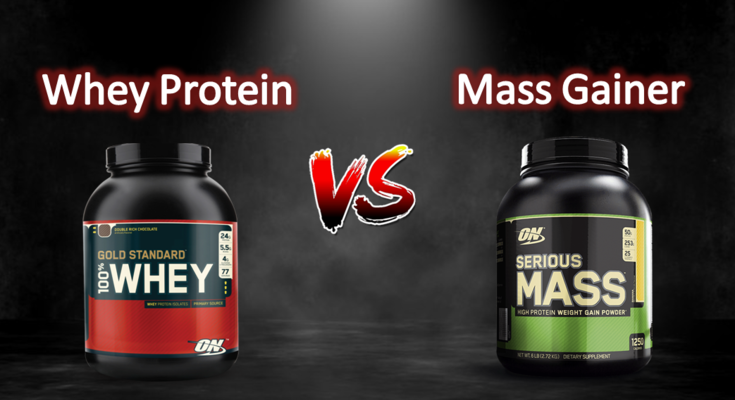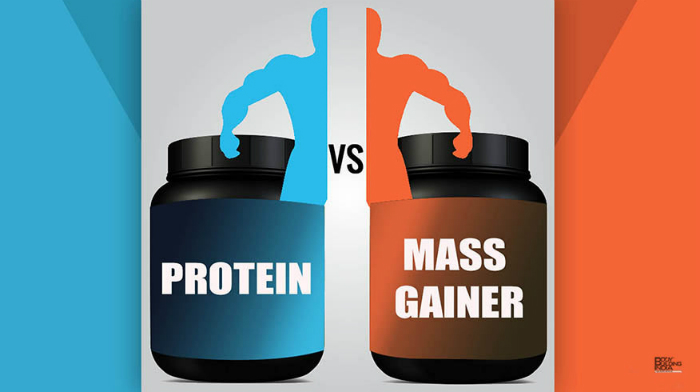Which Should I Choose: Mass Gainer or Whey Protein?
re you that skinny guy who enters the gym for the first time? Chances are you’re asking yourself this: should I take a mass gainer or whey protein? Generally, both body mass gainer supplements are effective in carving your muscles. However, they have very different effects on your system.
So how do a mass gainer and whey protein differ? Read on.
MASS GAINER VS. WHEY PROTEIN SUPPLEMENTS
Both mass gainers and whey contain protein. However, mass gainers tend to have higher fat and carb content. This is a total opposite of whey protein where these two substances are minimized.
In fact, most mass gainers will have a 2:1 carb to protein ratio. In short, if you purchase one with 25 grams of protein, it would have 50 grams of carbs. Some mass gainers would have a 3:1 ratio.
Why is it the case? Well, for skinny guys who are trying to bulk up, it’s not just about protein. They also need a large source of energy to power up their workout.
The main purpose of mass gainers is to gain weight in order to start building muscles. It also helps skinny individuals meet their needed calorie intake to start packing up energy.
So will mass gainers make you fat? Not necessarily. After a person gains weight, it will soon be replaced with muscles if s/he works out properly.
On the other hand, whey protein is also a good choice if you want to build muscles and trim down excess fats. Due to its very low carb and fat content, whey can help reduce calorie intake without depriving the body of energy.
Most of the time, protein can be converted to glucose to sustain the body’s energy needs. Much so, protein can’t be stored as fats. But in this case, it doesn’t help you gain weight, but it will still help in building muscles.
BENEFITS OF TAKING MASS GAINERS
For reluctant carb eaters, mass gainers are a great way to pack up calories and energy. And since it also contains high levels of protein, it becomes a versatile choice when trying to build muscles.
The glucose component of mass gainers is effective in initiating muscle recovery during and after an intense workout. It can also improve protein balance as compared to just consuming protein alone.
When you work out, your body needs high levels of energy. If you consume protein alone, chances are your system will use up much the amino acid to the point that you’ll experience protein imbalance.
Most of all, mass gainers are highly beneficial for individuals who are quite skinny. Working out with high protein supplements alone isn’t enough. They need an extra kick of carb energy to avoid imbalances.
A body mass gainer will also prevent skinny people from being muscular yet thin. By pumping their mass, their bodies will look fuller.
DOWNSIDES OF TAKING MASS GAINERS
Just like any supplements, mass gainers have its share of disadvantages. First, consuming too much mass gainers may lead to excessive weight gain.
The common mistake of mass gainer takers is they assume that all the calories they get from these supplements will automatically turn into muscles. Take note, though, that for mass gainers to take effect, you need to work out and train.
Another downside to mass gainers is that it can cause cramping if you fail to hydrate often. The culprit here is the creatine content. As much as this helps in building muscles, you need to gulp down glassfuls of water often.
Also, creatine may result in gastrointestinal problems to some. Make sure that the dosage that your mass gainer contains matches your needs. One more thing that you have to watch for your creatine intake is that too much of it can cause kidney disease.
Anyway, this isn’t meant to scare you off from taking mass gainers. As long as you read the label and manage the dosage, everything should go well.
WHEN TO TAKE MASS GAINERS
Generally, if you’re skinny and you want to gain mass and muscles, mass gainers are the right choice for you. Unless you’re planning to take more carbs on your meals, you can also try whey protein.
Just remember that mass gainers are filled with carbs. If you’re on the heavy side and want to lose weight, mass gainers are counterintuitive choices.
Just to give you an idea, a serving of mass gainers can give you as much as 1,500 calories while you only get as much 170 calories on each serving of whey protein. If you’re trying to lose weight, a body mass gainer isn’t for you.

BENEFITS OF WHEY PROTEIN
If you’re wondering if whey protein is a good choice, you might be impressed with our findings. Whey is one of the most-studied types of protein and it also contains all the essential and non-essential amino acids found in protein.
Whey is actually a by-product of cheese making. After curdling, whey and casein are left and it will be processed to filter out other non-protein and non-whey substances. This is why it’s very low in carbs, fat, and sugars.
If you want to gain muscles and lose weight, whey protein is the unbeatable choice. It also supports restrictive diets like Keto, Atkins, and Lacto vegetarianism.
Whey protein is fast-digesting which means it makes a perfect post-workout snack. The amino acids it contains will go straight to your muscles so it can start recovery and repairs.
Actually, whey protein is considered to be the purest non-plant-based protein you can take. And why not? Its formula is so versatile it can be cooked with meals and added to desserts which are a big advantage over body mass gainer.
TYPES OF WHEY PROTEIN
If you’re planning to purchase your whey protein, take note that there are three types available in the market: the isolate, concentrate, and hydrolyzed whey.
>Whey Isolates. This is, by far, the “cleanest” whey formula. It’s micro-filtered to remove any non-protein substances. There are whey isolates that are free of carbs, lactose, sugar, and other fillers. This can fit on almost any diet, even for people who are trying to gain mass.
>Whey Concentrate. A tad lower in quality with isolates, concentrates have more calories, carbs, and fats. However, it’s also packed with peptides that were stripped off from isolates. The only downside with concentrates is its higher lactose content.
>Hydrolyzed Whey. Hydrolyzed whey undergoes more processes to break down the protein content further. This is done to improve digestibility and absorption. It also removes more non-protein substances. Whey isolates can be hydrolyzed for faster absorption.
DOWNSIDES OF TAKING WHEY PROTEIN
No matter how seemingly perfect whey protein is, it also comes with some downsides. First, it’s a dairy-based protein which means it’s not suitable for vegans. Also, some isolates tend to have more lactose than other products.
If you’re trying to pack up with mass, I’m sad to break the news that whey protein alone can’t help you with that. You need to eat lots of carbs and pair it with your choice if isolate.
One thing I have to warn about is that some whey isolates are amino spiked. It means that some manufacturers will infuse the formula with artificial amino acids to make it appear as a complete protein. This spells trouble for your muscle building.
And like mass gainers, you have to pay attention to the dosage to avoid overconsumption.
WHEN TO TAKE WHEY PROTEIN
As a fast-digesting protein, the perfect time to take whey is right after your workout. Most whey isolates nowadays are easy to mix. You just blend it with water or milk and you’re good to go.
For those trying to lose weight, this is the best protein you can ever take. It’s very low in carbs (some even have zero carbs), fats, and other caloric content. And if you’re trying to build more muscles, this is also our leading choice.
However, we want to warn about taking whey when you’re pregnant. Always seek the advice of your physician or avoid it for the meantime if possible.
Also, whey protein tends to have negative interactions with a few medications. If you’re currently under a prescription drug, ask the clearance of your doctor first before integrating whey protein on your diet.
WHAT TO CHOOSE?
This is a matter of preference. We can’t say for sure “who wins” because both mass gainers and whey protein are excellent in muscle building.
Like what we discussed above, you have to identify your purpose from taking the supplement. If you’re a thin guy who needs mass before gaining muscles, you’re better off with mass gainers.
On the other hand, if you’re someone who’s trying to lose weight or just increase protein uptake, whey isolates are the best choice.
Here’s a simple guide to help you decide:
For a lean physique. If you’re trying to maintain a lean and slim body, its’ recommendable that you take whey protein. There’s very little carbs and fats here.
Weight gain and bulking up. With the calorie content of mass gainers, there’s no doubt that it’s the best supplements for muscle gain.
Body building. If you want to get ripped, whey isolates are better options. Mass gainers may help but the carb content may store more fats in your body than what you intended.

MASS GAINER VS. WHEY PROTEIN FAQS
Got some questions in mind? Here are a few queries we received and answered:
Q: What if I want to lose weight, which should I choose?
A: Whey isolates are the way to go if you want to burn your excess pounds.
Q: Is there such a thing as “too much protein”?
A: Yes, it’s the same reason why the RDA suggests 0.8 grams of protein per kilogram of our body weight. You can take more depending on your physical activities. However, don’t consume too much as it may tax your kidney and liver.
Q: Can I take mass gainers if I just want to increase my protein uptake?
A: Yes and no. If you also need to gain mass while taking more protein, it’s a yes. But if you don’t want the excess calories, it’s a no.
Q: Can I use mass gainers as meal replacements?
A: Yes, as long as it meets your needs without compromising your intake of other essential vitamins and minerals.
Q: Can I take whey protein every day?
A: Yes, as long as you follow the serving suggestion in line with your needs.





